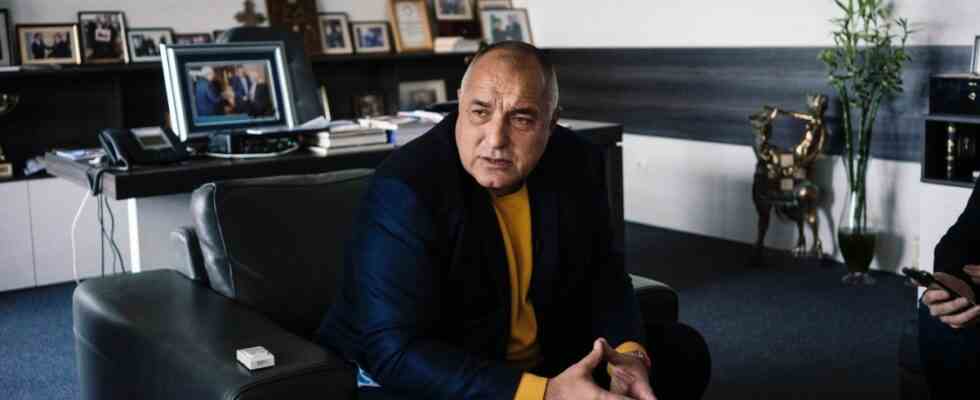If another miracle doesn’t happen, Assen Vasilev, co-leader of the young Bulgarian party “We’re continuing the change,” said a few days ago, then his compatriots would have to go to the polls again in early April. For the fifth time in two years. But miracles are very rare in politics. And in Bulgarian politics, where personal hostilities, alliances with influential oligarchs, pro-Western and pro-Russian camps form a toxic mix, political miracles are usually prevented anyway.
Since the parliamentary elections in October, two other attempts to form a coalition between the divided parties have failed. In any case, since the election in April 2021, transitional governments appointed by the president had been in office for most of the time. First in July 2021, then in November 2021 and finally again in October 2022. Ex-Prime Minister Boyko Borissov, having won the election, had once again tried to form a government on behalf of the President in the past few weeks. Because he can no longer be placed personally as prime minister, he had offered a change of leadership at the top of his Gerb party. But all possible partners said no: nothing goes together with the corrupt power politician, who would continue to pull the strings in the background.
Then Vasilev’s party was given the task of forming a government. In the first half of 2022, he was finance minister in a reform government led by his friend Kiril Petkov. The four-party coalition led by the two pro-Western politicians had done a lot on the fight against corruption and energy security, and organized support for Ukraine alongside its Western partners. But their coalition only lasted a few months. Because then the first partner, the party of the erratic entertainer Slawi Trifonow, jumped out again. Governments have a short half-life in Bulgaria.
Vasilev and Petkov nominated Minister of Education Nikolai Denkov for a new attempt and in early January presented a program for modernizing the economy, for energy security and national security. But they didn’t even make it to the vote in parliament – no chance of a majority. It’s been like this for many months. Now a small group, Democratic Bulgaria, under ex-Justice Minister Hristo Ivanov, could get the nod from President Rumen Radev. But his chances of organizing support for a minority government, for example, are again slim.
The “substitute king” is weakened
The renowned Bulgarian political scientist and author Ivan Krastev has long since seen the parties in the primary campaign again. the Süddeutsche Zeitung he said that as president, Radev benefited for a while from being able to set up interim governments and thus be able to effectively rule the country. But increased attacks by political partners, especially the pro-Russian socialist party BSP, weakened his position as a “surrogate king”.
Despite the political stalemate, things are in flux behind the scenes. Pro-Russian forces, traditionally strong in the country, have intensified their propaganda. The war in Ukraine, in turn, has brought the pro-Western camp closer together. Government programs and central projects are drafted and rejected, with the Socialists there are signs of a change in leadership, with Gerb as well. All of this has noticeable consequences. Due to the poor economic data, the interim government has not presented a budget for 2023, the planned introduction of the euro from 2024 is in jeopardy, entry into the Schengen zone has failed for the time being due to the veto of Austria and the Netherlands. An elected, stable, effective coalition would therefore be urgently needed.
Krastev does see Bulgaria on the way to a new government – but only after the next early parliamentary elections. According to the Vienna-based scientist, the central player will continue to be that political animal Boyko Borissow, whose Gerb party is likely to emerge again with the most votes from an election campaign. Borisov himself, who was Prime Minister several times between 2009 and 2021 and whose career was accompanied by numerous corruption scandals, is history. But he remains enormously influential, has allies among the mayors of the big cities and still has good contacts in the EU.
The Russian war of aggression also plays an important role in Bulgaria’s political and social development. While both the reform government under Petkov and the current interim government under Prime Minister Galab Donev have actively and demonstratively supported Ukraine, pro-Russian media and parties are mobilizing. Bulgarian journalist Alexander Andreev, who explored Russia’s influence for the specialized journal Southeastern Europe has analyzed Bulgaria “seriously endangered” by Kremlin trolls, bought journalists and politicians. At the same time, however, the population condemned the atrocities committed by the Russian army. That is a glimmer of hope, according to Andreev: compassion and loyalty to the alliance – despite increased Russian influence.

